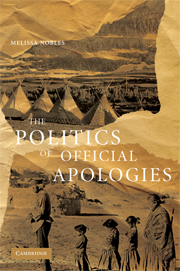Book contents
- Frontmatter
- Contents
- Preface and Acknowledgments
- 1 Toward a Membership Theory of Apologies
- 2 History of National Memberships in Australia, Canada, New Zealand, and the United States
- 3 To Apologize or Not to Apologize: National Histories and Official Apologies
- 4 Beyond Sentiment? Apologies and Their Effects
- 5 The Weight of History and the Value of Apologies
- Appendix: Twentieth- and Twenty-First-Century Public Apologies
- Bibliography
- Index
5 - The Weight of History and the Value of Apologies
Published online by Cambridge University Press: 24 May 2010
- Frontmatter
- Contents
- Preface and Acknowledgments
- 1 Toward a Membership Theory of Apologies
- 2 History of National Memberships in Australia, Canada, New Zealand, and the United States
- 3 To Apologize or Not to Apologize: National Histories and Official Apologies
- 4 Beyond Sentiment? Apologies and Their Effects
- 5 The Weight of History and the Value of Apologies
- Appendix: Twentieth- and Twenty-First-Century Public Apologies
- Bibliography
- Index
Summary
This book has argued that political actors use apologies to advance group rights based on historical claims. Apologies can be strategically effective as well as emotionally satisfying. Yet, when compared with material reparations, apologies are often judged “cheap talk.” This presumed trade-off between apologies and reparations does not easily hold up, however. Apologies sometimes accompany reparations, and vice versa. The political actors and certain of their motivations (such as guilt and the desire to rectify past wrongs) are often the same. Nevertheless, under particular circumstances, such as those of historical injustices, political actors may marshal apologies and reparations to serve different purposes. Apologies potentially “open the books,” whereas reparations close them. On this view, apologies can potentially be as consequential and as “costly” as reparations, although in different ways. Whereas reparations are lump-sum payments and settlements, apologies help to justify government policies designed to redistribute political authority and economic resources substantially over the long term.
As we shall see, the one shared and seemingly unqualified benefit of apologies and reparations, according to some, is a reexamination of the historical record. Yet, political actors, as our cases show, judge the importance of history differently, at least as it relates to indigenous claims. Whether the historical record is now regarded as more “truthful” does not subsequently mean that the content or direction of government policies on indigenous issues is self-evident.
- Type
- Chapter
- Information
- The Politics of Official Apologies , pp. 139 - 154Publisher: Cambridge University PressPrint publication year: 2008

